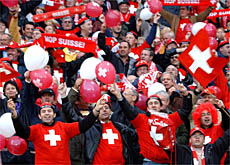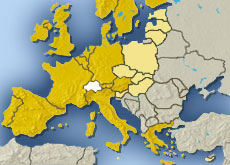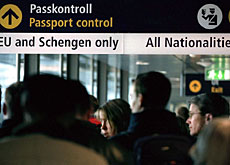Rightwing success threatens bilateral agreements

Following the electoral success of the rightwing People’s Party, bilateral negotiations between Switzerland and the European Union are expected to become tougher.
The main bones of contention are the Schengen-Dublin accords on crime and asylum, and the extension of an agreement on the free movement of people.
Shortly after Sunday’s parliamentary election, the Swiss delegation met up with their EU counterparts for further discussions on the second set of bilateral accords.
“We continue to work on the bilaterals,” said Dieter Grossen, deputy head of the Federal Office of Immigration, who headed negotiations on the extension of the free movement of people.
“The result in Sunday’s election does not have a direct impact on Switzerland’s negotiations with the EU,” he added.
New negotiations
However, negotiations on the second set of bilateral agreements could be jeopardised. The People’s Party, which is now the strongest force in Swiss politics, is firmly against closer integration with the EU.
Hans Fehr of the Zurich wing of the People’s Party and head of the campaign for an “Independent and Neutral Switzerland (AUNS)” thinks the result is a clear indicator that Switzerland’s European policy will change.
“Negotiations on a possible EU membership have to stop immediately and the bilateral agreements have to be reviewed,” he said.
“This would also put an end to the extension of the free movement of people and the Schengen-Dublin agreements.”
Schengen-Dublin
Switzerland wants to become a member of the Schengen-Dublin accords – the EU’s common policy on cross-border crime and asylum – as it would facilitate combating organised crime and illegal immigration.
Talks are currently underway on these issues, but Switzerland’s insistence on preserving banking secrecy has been a major stumbling block in the negotiations.
Further negotiations are scheduled for the end of November, but the People’s Party has already threatened the government with a nationwide referendum.
The party argues that Schengen membership would undermine Switzerland’s sovereignty, as border controls would cease to exist under the accord.
Since the Schengen accord forms part of the second set of bilaterals, a “no” vote in a referendum would mean that all ten accords, including those on pensions, taxation of savings and media, would fail.
Free movement of people
The People’s Party has also criticised extending an existing agreement on the free movement of people to the ten new countries that will join the EU in 2004.
Negotiations on quotas, time limits and exemptions have proved to be rather complicated, and a solution is still far off.
The People’s Party has called a referendum on this issue, which could have serious ramifications. If Switzerland does not agree to the extension, the EU can terminate the agreement all together.
According to one EU official, this would threaten the first set of bilateral agreements that came into force on June 1, 2002.
The official explained that all dossiers have a so-called “guillotine clause”, which would torpedo the whole set of bilaterals in the case of just one agreement failing.
Anti-Brussels
The anti-Brussels policy of the People’s Party is all the more threatening to Swiss-EU relations, as the centre-right parties, the Radicals and the Christian Democrats, do not have clear stance on Europe.
The EU has even described Switzerland’s position on future membership of the bloc as “controversial”.
Commentators say Brussels has always seen the bilaterals as a first stage towards full membership of the bloc – a view certainly not held by the People’s Party.
And they believe Brussels would be unwilling to continue negotiations if it thought Switzerland was reneging on this unspoken promise.
“If this were withdrawn, it would be difficult to explain to the EU member countries why Switzerland had been working on special accords with the EU,” said a EU commissioner.
swissinfo, Katrin Holenstein (translation: Billi Bierling)
The rightwing People’s Party won almost 27 per cent of the vote in Sunday’s parliamentary elections.
The party campaigned against closer integration with the European Union.
Swiss President Pascal Couchepin and the president of the European Commission, Romano Prodi, are due to discuss the second set of bilaterals on Friday in Lausanne.

In compliance with the JTI standards
More: SWI swissinfo.ch certified by the Journalism Trust Initiative











You can find an overview of ongoing debates with our journalists here . Please join us!
If you want to start a conversation about a topic raised in this article or want to report factual errors, email us at english@swissinfo.ch.